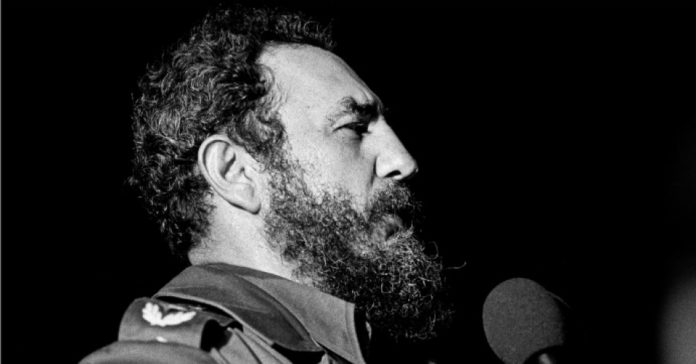
“Ever onward, to victory,” Raúl Castro said, announcing his brother’s death.
Former Cuban President and revolutionary leader Fidel Castro is dead at 90, his brother Raúl Castro announced late Friday on Cuban state television.
“At 10:29 at night, the chief commander of the Cuban revolution, Fidel Castro Ruz, died,” he said, without giving a cause of death.
Fidel Castro “had been in poor health since an intestinal ailment nearly killed him in 2006,” Reutersnoted.
“Ever onward, to victory,” Raúl said, using the revolutionary slogan.
Just this April, Fidel Castro gave a “valedictory speech” to the country’s Communist Party congress, telling its members he would soon die and calling for them to carry on his leftist ideals. “I’ll be 90 years old soon,” he said at the time. “Soon I’ll be like all the others. The time will come for all of us, but the ideas of the Cuban communists will remain as proof on this planet that if they are worked at with fervor and dignity, they can produce the material and cultural goods that human beings need, and we need to fight without truce to obtain them.”
Tweets about “Fidel Castro”
In Cuba under Castro, that fight resulted in some positive social reforms, such as universal healthcare and education. “In 2011, the literacy rate in Cuba was estimated to be 99.8 percent,” Dominique Mosbergen reports for the Huffington Post.
On the international stage, “Castro’s (and [Che] Guevara’s) role in assisting the decolonization process in Africa was second to none,” wrote University of Leeds Latin American history professor Manuel Barcia, noting Cuban support for “the liberation struggles in Mozambique, Namibia, Zaire (now the Democratic Republic of Congo), Guinea-Bissau, and Angola, among many others.”
Castro’s Cuba also played a pivotal role in helping to end apartheid in South Africa.
But back at home, Mosbergen writes,
in his years in power, Castro is also said to have demanded absolute subservience from the Cuban people and was known for quashing freedom of press and imprisoning people he deemed “anti-social,” including dissidents, artists, and members of the LGBT community.
Still, as author and editor Belen Fernandez pointed out in an op-ed Saturday:
Although Cuba does not qualify as an objectively free society, it’s important to recall that curtailments to Cuban freedom do not occur in a vacuum. Instead, they occur on an exposed island that has, for the duration of its contemporary history, resided in imperial crosshairs.
Given the sustained U.S. effort to overthrow the Castro regime, and the system itself, with the help of fanatical Cuban exiles prone to terrorism and sabotage, state paranoia has perhaps not been unfounded. Repressive security measures stemming therefrom qualify as reactive in nature, and a result of vindictive U.S. policy.
As the Guardianreports:
As in life, in death Castro was deeply divisive. The announcement of his death was widely greeted online with celebration and condemnation of a “cruel dictator” and his repressive regime.
Others mourned the passing of “a fighter of U.S. imperialism” and a “charismatic icon.”
“[B]eyond anything else, it was Mr. Castro’s obsession with the United States, and America’s obsession with him, that shaped his rule,” the New York Times wrote on Saturday.
The newspaper explained:
After he embraced Communism, Washington portrayed him as a devil and a tyrant and repeatedly tried to remove him from power through an ill-fated invasion at the Bay of Pigs in 1961, an economic embargo that has lasted decades, assassination plots, and even bizarre plans to undercut his prestige by making his beard fall out.
Mr. Castro’s defiance of American power made him a beacon of resistance in Latin America and elsewhere, and his bushy beard, long Cuban cigar and green fatigues became universal symbols of rebellion.
Indeed, that defiance persisted even as his health declined and relations between the U.S. and Cuba began to thaw in December 2014.
Following U.S. President Barack Obama’s historic visit to the island nation in March, Castro penned a powerful column in which he recounted half a century of U.S. aggression, including the 1961 Bay of Pigs invasion, when “a mercenary force with armored artillery and infantry, backed by aircraft, trained and accompanied by U.S. warships and aircraft carriers, attacked our country by surprise.”
“After a ruthless blockade that has lasted almost 60 years, and what about those who have died in the mercenary attacks on Cuban ships and ports, an airliner full of passengers blown up in midair, mercenary invasions, multiple acts of violence and coercion?” he wrote. “Nobody should be under the illusion that the people of this dignified and selfless country will renounce the glory, the rights, or the spiritual wealth they have gained with the development of education, science and culture.”
The Cuban people, Castro said, “are capable of producing the food and material riches we need with the efforts and intelligence of our people. We do not need the empire to give us anything.”
To mark Castro’s death, the Real News Networkreplayed a recent interview with historian and author Aviva Chomsky, coordinator of Latin American studies at Salem State University. Watch below:
This work is licensed under a Creative Commons Attribution-Share Alike 3.0 License




